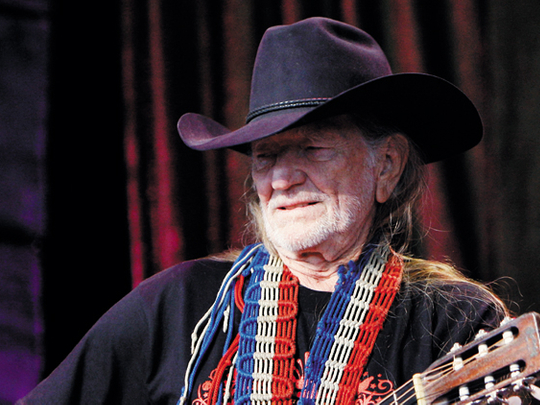
In his final earthly throes, Johnny Cash set a new standard for ageing country icons: Unload the heavy stuff at the end of the line.Cash's final recordings were so sodden with remorse, they felt like penance for a lifetime spent raising hell.
Now, more than six years after Cash's death, Willie Nelson, 76, and Merle Haggard, 73, stand as country music's reigning troublemakers-turned-elder-statesmen. And whether they like it or not, we turn to them as oracles, yearning for Cash-like parables of wisdom and comfort. We want to hear life's most brutal lessons swaddled in steel guitar.
Nelson's and Haggard's new albums have very different tones. Nelson's Country Music is a calm, contemplative and remarkably consistent album. (After dalliances with blues and, um, reggae, this mix of standards, covers and originals is his most focused outing in years.) Haggard's I Am What I Am feels stiff and stubborn - and often too much so for its own good.
Nelson has no such problems, thanks to the skilful touch of T Bone Burnett, the uber-producer who's scared up a few Grammys over the course of the decade Having snatched ‘Album of the Year' honours last year for Raising Sand, the 2007 disc he produced for Robert Plant and Alison Krauss, Burnett has recruited some of the same backing musicians to support Nelson on Country Music, as well as singer Jim Lauderdale and guitarist Buddy Miller.
And while Nelson's voice remains front and centre throughout, Burnett's fingerprints are all over ...Your Kingdom Must Come Down. It's a traditional hymn that nudges Nelson out of his easy-breezy comfort zone, placing those warm, generous pipes in an eerie new context. The musicians barely touch their instruments as they creep along to the song's phantom pulse.
Even more foreboding is Dark as a Dungeon, a cautionary tale that feels particularly harrowing in light of the 29 workers that perished in a West Virginia coal mine last month. In the tune's lilting refrain, Nelson describes a place "where danger is double and the pleasures are few/ Where the rain never falls and the sun never shines."
My Baby's Gone might be the most heartbreaking ballad in the bunch. When Nelson declares that his "world has ended," it's hard to tell if he's singing through a smile or a frown.
Where Nelson's voice is elastic, Haggard sounds brittle. It's forgivable: this is Haggard's first time in the studio since being diagnosed and treated for lung cancer in 2008. His album opens with I've Seen It Go Away, a been-there, done-that ditty about how the greatness of yesteryear will never be eclipsed. "When you've seen the very best, the rest can hardly play," Haggard grouses, more cranky than incensed. Much better, though, is How Did You Find Me Here?, a ballad that finds our hero singing from the bottom ofan open grave."I thoughtI had been left here to die," he sings, his voice sounding more stern than stiff.
The rest of the album offers uncomplicated arrangements and the lyrical themes to match.
We're Falling in Love Again recounts the tale of a marriage brought back to life after the kids go to college. The tune waltzes along at a geriatric pace, and Haggard pivots from cantankerous to cute. "We're having good times again in old honky-tonk bars/Staying out late again, making love 'neath the stars," he sings. "Slow-dancing together to an old country band/Caressing your fingertips and holding your hand."












